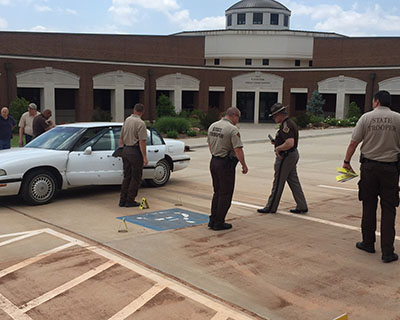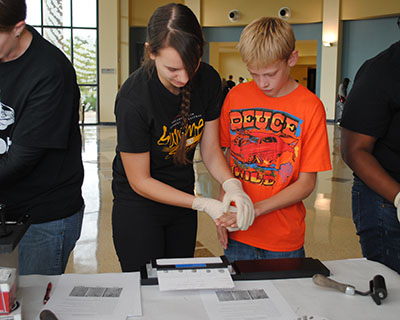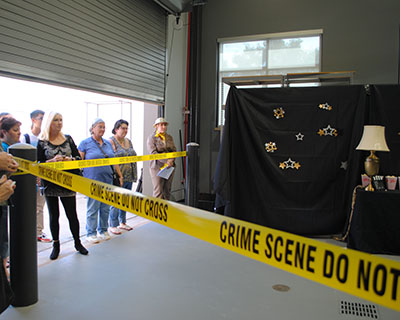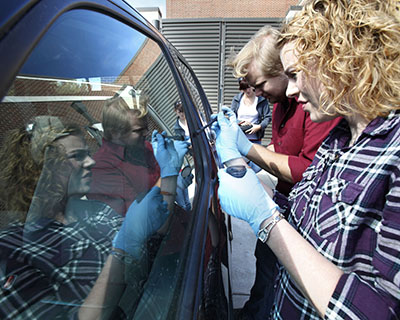Law enforcement training, Edmond Police, February 16-17
Protecting Houses of Worship, US Attorney’s Office, Western Dist, May 10
Cellebrite training for Law Enforcement, May 12
Law enforcement training, Edmond Police, February 16-17
Protecting Houses of Worship, US Attorney’s Office, Western Dist, May 10
Cellebrite training for Law Enforcement, May 12

Shaken Baby Syndrome Investigations, April 11
Oklahoma Highway Patrol Crime Scene Processing, May 9-13
IAI Conference, May 18-20

Implementing and Evaluating 3D Technology in a 2D World, Orlando, February 16
Dr. Jane Homeyer, Deputy Associate Director, National Intelligence, “Ethics, Doing the Little Things Right”, April 3
Behavorial Aspects of Child Abductions, Missouri, April 14

Crime Scene Investigation, January 9 & 10
A DNA revolution, April 21
Forensic Toxicology, April 23
Death Scene Investigations, January 16, 2013
Careers in Forensic Science, January 30, 2013
QA in Crime Labs, March 11, 2013

Research in Forensic Laboratories, OSBI Consortium, January 20, 2012
Toolmark Identification, Feb 7-8, 2012
International Workshop: Radiological Crime Scenes (IAEA) Canberra, Mar 19-23
2/24 Mike Wieners, FBI Laboratory – Fingerprint misidentification in the Madrid Train Bombing
3/10 Erin Henry, OSBI Forensic Science Services – Quality Assurance in Crime Laboratories
Dr. Ken Goddard, Director, U.S. Fish and Wildlife Forensics Laboratory, Ashland, Oregon
3/21 7:00 – 8:40pm “Wildlife Forensics” FSI Room 106
3/22 2:30 – 3:45pm “Underwater Forensics” FSI Room 106
4/7 Cindy Cunningham, Oklahoma Bureau of Narcotics – Testifying in Court as an Expert Witness
4/21 Dr. Max Houck, West Virginia University – “What is ‘Forensic’? What is ‘Science’?”
Familial DNA Searching to Solve Unsolved Crimes
Rock Harmon, former Alameda County DA, Oakland, CA
Tuesday, September 27
Case Assessment and Interpretation, January 21, 2010 – This workshop, for police investigators, forensic scientists, legal professionals and others in law enforcement presented a high level overview of the concept of Case Assessment and Interpretation (CAI) and demonstrated how CAI could deliver benefit to the law enforcement and judicial system. CAI is a methodology to provide cost-effective forensic services, improve casework response times, and maximize evidential value. The workshop outlined the challenges of implementation and show how CAI is used in practice by investigators and scientists. The workshop will be delivered by leading CAI experts currently with the United Kingdom’s Forensic Science Service, supported by representatives from United Kingdom policing and United Kingdom Government.
Advanced Homicide and Crime Scene Training for Law Enforcement Officers working Indian Country matters, February 2-5, 2009. Participants for this seminar were limited to FBI and BIA/Tribal Law Enforcement Officers currently working Indian Country matters. Topics covered included Forensic Anthropology, Forensic Pathology, Forensic Entomology, Crime Scene Reconstruction, Arson, and Case Presentations. This seminar was co-hosted by the FBI’s Indian Country Unit.
Latent Print Comparisons: Putting ACE-V Into Words, November 17 and 18, 2009 – This training workshop for latent print examiners and others in law enforcement covered all aspects of the Analysis, Comparison, Evaluation and Verification (ACE-V) methodology, including distortion and the mental process that occurs when analyzing latent prints. The workshop will focus on how to describe the ACE-V process to jury members, attorneys, and other professionals. Blind verification and its impacts on the latent print community will also be covered. The workshop, sponsored by the Forensic Science Institute, will be taught by two latent print examiners currently with the FBI Laboratory.
Digital Evidence for the First Responder, January 31, 2008 – The Forensic Science Institute hosted the Certified Electronic Evidence Collection Specialist (CEECS) certification course. The CEECS is a basic one-day course offered only to Law Enforcement officers and Law Enforcement support personnel. The course was designed to instruct personnel on how to collect electronic evidence in a forensically sound manner. The course included lecture, a practical exam, and a written exam. Upon successful completion of the written examination, the course attendee was awarded a CEECS certification issued by the International Association of Computer Investigative Specialist (IACIS).
Daubert Challenges to Latent Print Testimony, March 11, 2008 – The Forensic Science Institute hosted a seminar by two leading experts in Latent Print Identification. Heather Webster and Melissa Gische, both examiners with the FBI Laboratory, presented lectures specifically designed for law enforcement and forensic science personnel as well as students and faculty. This seminar was co-hosted by the Norman, Oklahoma Police Department and the Oklahoma Division of the International Association for Identification. Topics covered in this seminar included a brief history of significant court cases challenging the scientific reliability of fingerprint evidence; Daubert guidelines- what they are and how to address them in a Daubert hearing; preparation for cross-examination; and current issues (“hot topics”) in the field.
Copyright © 2025 Forensic Science Institute, All Rights Reserved
UCO DISCLAIMER STATEMENT: The views, opinions, and conclusions expressed in this page are those of the author or organization and not necessarily those of The University of Central Oklahoma or its officers and trustees. The content of this page has not been reviewed or approved by The University of Central Oklahoma and the author or organization is solely responsible for its content. It is the policy of the university to abide by and follow federal and state laws. Outbound links, such as third party websites or personal pages of UCO's students, faculty and staff represent individual views and do not necessarily reflect the views and/or policies of the university. The university is not responsible for the content of these pages or any links that you may follow from this server beyond this point. The statements and communications of the bloggers on the University of Central Oklahoma website do not represent a statement of the university's official position or policy.